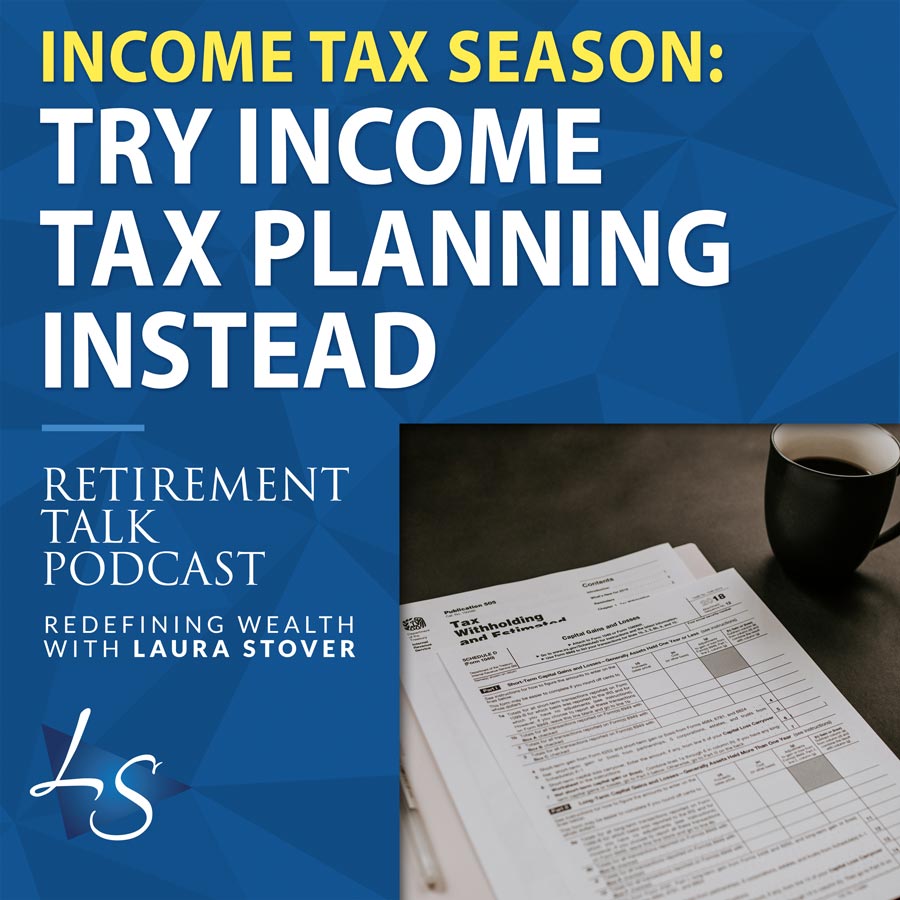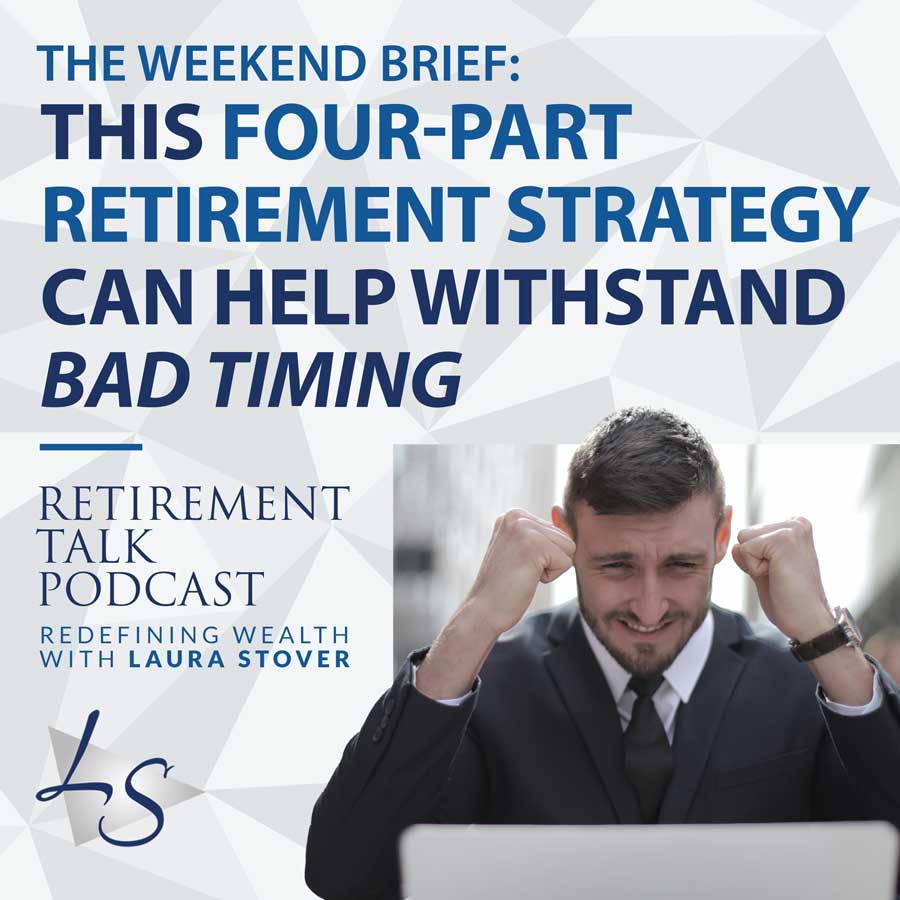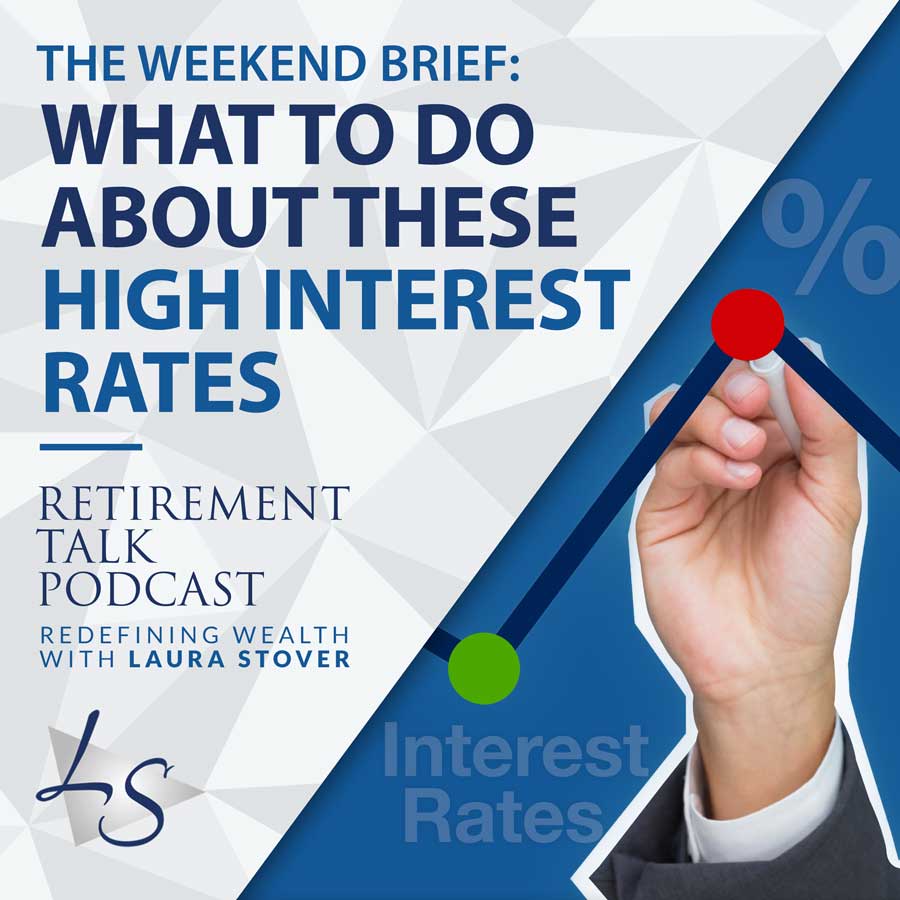Are you dreading this upcoming income tax season? It may be time to switch from tax preparation to tax planning. Strategic planning can reduce your overall tax burden, making this time of the year a lot less stressful. You should be working with a tax professional that is a part of your overall financial planning team.
One of the first steps in tax planning is projecting your future income. This means looking at your accounts, tax brackets, and your projected taxes with an as-is scenario. If you are in your earning years you have to understand the impact of earning even on more dollar and what that does to your overall tax plan. In contrast, a lot of retirees are leaving money on the table. Strategic tax planning can save you stress, time, and money.
We also want to be able to make knowledgeable decisions about our future income, predicting where taxes are going to go and how far. Unfortunately, we can’t predict the future, but there are strategies to proactively pay taxes now instead of waiting for higher taxes in the future. On today’s episode, we’ll discuss these planning steps and a variety of planning strategies that can reduce your overall tax burden.
For a copy of our 2022 tax guide please email: [email protected] or go to https://redefiningwealth.info/schedule/
Review the article mentioned in today’s show >>
Rate & Review and Subscribe to the Podcast:
https://podcasts.apple.com/us/podcast/retirement-talk-podcast-with-laura-stover/id571347188
Links
Schedule a Review: https://redefiningwealth.info/schedule/
Timestamps (show notes):
4:46 – Working with a team of professionals
6:56 – Projecting income for a given year
13:02 – Knowledgeable decision making
19:21 – Software that our CPA team uses
21:10 – Saving a client 58% on her taxation
23:25 – Strategies to reduce your tax burden
26:23 – Managing your income taxes
Listen & Subscribe
Review the Transcript:
Ron Stokes :
Welcome to Retirement Talk, the redefining wealth show, your source for financial information specifically for pre-retirees and retirees. We’re here each and every week to help you better navigate during these economic times. We’re here to discuss thoughts and ideas in the field of finance and retirement, as well as discuss trending topics that can impact your bottom line. We’ll break it all down. These discussions can help you make better informed decisions so you can make better financial choices and live the lifestyle you imagined for retirement. Laura Stover is a registered financial consultant and CEO of LS Wealth Management, as well as founder and owner of LS Tax, a consulting firm. She’s been featured in Forbes, CNBC and The Wall Street Journal. I’m Ron Stokes. Our topic for today is from the street, dreading income tax season? Try income tax planning instead. Now, here are your hosts, Laura Stover, along with certified financial planner, Michael Wallin.
Laura Stover :
Hello, hello, hello. It is that time of year where a lot of people have some anxiety and it’s not because of all the snow that we’ve been getting up here in the North. That does give a little bit of anxiety, but it’s that time of year where some people really dread the feeling that someone’s watching or looming over you by the name of Uncle Sam. That not so likable or favorable member of our family called Uncle Sam and it is tax time. And it can be a little bit devastating to some people. There was a lot of tax breaks for 2020 when people went to do their ’21 returns last year. And I think the fallacy is just a lot of times, there’s really a difference between tax preparation and tax planning, and there’s ways to plan for taxes that can reduce your overall lifetime tax burden and really get Uncle Sam to stop be so frightening. So our focus today with my good friend and co-ho, certified financial planner, Michael Wallin, how you doing Mike?
Michael Wallin :
I’m doing great Laura. How about yourself? I heard you’ve been out shoveling snow.
Laura Stover :
I’m obsessed. Yeah. I bought this new, the Snow Plow, 30 inch. It’s a special type of shovel. It makes the job a lot easier, but I didn’t know that it was going to require assembly, which required a few tools that I do not have, but we did get it put together and thank you to my heating and filter guy that takes care of a few things. And I’ll tell you what. I’m ready to go. I just hope we don’t have any more snow. But like I hope there’s no more snow, a lot of people are hoping they’re not going to owe Uncle Sam a big tax bill this year. So Michael, our article is very timely, dreading income tax season, and really the focus should be trying tax planning instead. So we want to cover projecting income for a given year, making knowledgeable decisions about future income so that we understand how the tax code may change in the future. We want to hit that one. That’s a big one.
And determining what, if anything, can be done to lower the overall taxes that you pay depending on your financial situation and taxes may or may not be lower in retirement. And I think more of us are inclined to believe that we’re going to be paying a lot more in the not too distant future. So this is a timely article from the street and it is income tax season. And really the importance of having that proactive tax plan and not just working with preparers. It requires a team. That’s what we do here at LS Wealth. We have our CPA team under LS Tax, and that coordinates right now so much with the investment and wealth management team. This is a service that we utilize specifically for our wealth management clients. We do not have time to just prepare taxes as a whole for everybody, but we busy, busy, busy, and this is an essential part of financial planning. It’s more than just about your investments, this is more important than ever. And I think people are finally starting to realize that.
Michael Wallin :
Laura, the issue that most individuals find that when they are not working with a team of professionals that are all reading from the same book, we’ve just recently came out of the Super Bowl and the Super Bowl, as we watched the game, there was an offense and there’s a defense always on the field. And I think that the listeners really need to assess where they are today because their biggest challenge that if they are not playing both offense and defense and they take a fragmented approach, and they’re working with maybe a CPA to do tax preparation for them. But that person is not in tune with their financial or investment advisor, their financial planner, the idea of using safe money if it’s insurance based, that’s all a part of a holistic plan for them, looking at their health insurance. All of these components have to work together to give a comprehensive structure.
Now, most of the time when people think about taxes, like you just laid out in your opening comments, it’s this looming threat, and they’re looking at taxes as this burden. And they’re trying to find that individual that will minimize the amount of taxation, but it’s not a tax plan. Most tax preparers are historians. And basically what they are doing is writing down what happened last year. They are writing a history book for the client of what occurred in the previous 12 months at a time when other than putting money into a tax deferred account, there is no modification or adjustment of that history. What individuals truly need to be doing is working with a tax professional, a tax coach that is a part of the overall family practice where all facets of a person’s life, goals, dreams, and aspirations are considered because avoiding taxes is not always the best solution in the long term for the client.
Laura Stover :
So to the first point in terms of projecting income. To some, it means avoiding short term capital gains. Now, I think this is an area a lot of people are kind of familiar with, especially if they have not qualified individual or joint accounts, brokerage accounts. Then that word short term capital gains is always going to be looming on that type of tax status account. Others may be looking at tax brackets to determine if it makes sense to own, for example, municipal bonds. And I think tax planning really involves these three key areas.
The first one we want to hit here, projecting income for a given year. Each year, you can show the tax impact of changes in income. Now, financial professionals often utilize various software for this purpose, and there’s a lot of online calculators that can help people if they’re doing their own taxes get estimates. And I’ve seen clients use spreadsheets and model tax situations and compare them, but using the prior year’s tax form, that’s usually a good guideline, but you have to be aware of changes to the law.
Number one, especially if you’re doing your own tax work from year to year in terms of how that may impact the forms. And depending on the tools that you’re using, it may not include state or local taxes. So starting with projected tax for an as is scenario, I think that’s a good step one.
And then using the prior year’s tax return obviously is a logical starting point. And that scenario could include everything you already know and reasonable expectations about the current tax year. That really gives taxpayers more insight than they had previously regarding their upcoming taxes. But having these comparisons, I mean, this is kind of the advantage because taxes come in many flavors, and it does really dictate the tax bill, the projection of income. A lot of people had robust statements. We a good bull market in ’21. The last couple of years has been very good in terms of market returns. People can really get into some tax, not so good scenarios here if they don’t have a good plan in place.
Michael Wallin :
One of the areas that I like to talk, and it really determines if we’re talking as about someone that is prior to retirement, those individuals that are still in their earning years, or is it an individual that is already into their retirement years? If you’re in your earning years, you really need to understand what the earning of one more dollar does from a tax perspective, just like you’re saying Laura. And unfortunately, a lot of individuals, they earn money, but they don’t understand how they move up progressively through the tax rates or through the tax brackets is a better way of saying that. So they need to understand that because as they’re looking to make decisions, they need to have a plan that says, okay, well, if the market contracts, what do I want to do? If the market expands, they should have a written executable plan at that moment, but they also have to base that against the tax return.
Because what you don’t want to do is go into a scenario that you increase your taxation on a dollar by 25%. That would be the scenario if an individual went between a 12% tax bracket and a 15% tax bracket. They can immediately impact themselves with 25% more taxation, opposed to if they were in a tax bracket that say they went from the 24% tax bracket to the 28% tax bracket. At that point, we’re only impacting by about 16, 17%. So it’s important that you understand the tax code.
Now on the other side, that’s it for if you’re an earner. If you’re over in the retirement years, a lot of retirees leave money on the table because of the tax plan that President Trump put in place increasing standard deductions. A lot of individuals do not have enough earned income to actually get to that standard deduction. And they leave excess deductions on the table that they could have utilized to Roth money over. And again, a can consistent theme in our message is to move your money from fully taxable accounts to fully tax free accounts. Because if that can save yourself anywhere between 3, 4, 5% on a tax bracket now, and not even … We haven’t even talked about what future taxation could be. You’re talking about saving against your portfolio anywhere that could be between 5% and 15% of taxation in the future. And that is considerable amount of savings to help you against longevity risk as you are continuing throughout your retirement years.
Laura Stover :
Absolutely. And the US tax code to your point Michael, specifies tier tax rate brackets. Even those whose income places them in the highest bracket can take advantage of all the lower brackets, obviously too knowing really how to utilize that cylinder. We kind of put these tax brackets in a graduated cylinder if you remember that from high school science class, and this is really a nominal cost of what is the next dollar of ordinary income going to be. And it may not include all of the adjustments. And another thing, marginal tax rates, that’s the tax cost of the next dollar of income. And that’s not always listed on the tax return.
Now, the other point we wanted to cover here, the second point of three knowledgeable decision making we know about tax increases, they’re coming in 2026 because of the Tax Cuts and Jobs Act of 2017 sun setting, which lowered income taxes for individuals temporarily. And this is usually where we’re kind of guessing where tax rates are going and how far. For now, you can assess your current tax situation in light of the future increases already in the law. The exact income where each bracket’s going to start is slightly different between the current and the pre-Tax Cuts and Jobs Acts law for most people. The boundaries are very close, but comparable brackets. If you’re are someone in the 12% tax bracket, that may change to 15. I mean, again, we don’t have a crystal ball to know exactly what’s going to happen. That represents a 25% increase in taxes, though. And for those expected to be, let’s say maybe in the future 28% tax bracket, the current 24% tax bracket represents a savings of 16.7%. Any income that can be accelerated into years prior to 2026 represents a significant tax savings.
So it’s really important right now for people to be working with their investment advisor and CPA team together. I know we were very busy the end of last year with the comparison tables that our CPA runs on the software. And Billy puts that together and we had a lot of appointments. Don’t wait until December to start wanting to do all these conversions and contribute to those accounts up. Don’t wait till the last minute. This is really a methodical process to be proactive in paying some of that now, or maybe you’re a single filer, or I have a client in South Florida, beautiful Marco Island area. She makes a little too much money as a single filer. So she’s going to take advantage of a backdoor Roth while it is still available in order to get her maximum contributions in for the year.
Michael Wallin :
Well, and that’s having a plan as you stated earlier. Individuals need to spend as much time building a tax plan as they do their investment plan, their insurance plan, their healthcare plan. Because what we have is every time we’re earning money and since 1974, the bulk, and I think that Laura, most listeners on the call today would attest that outside of their home, the largest asset they have is probably either still sitting in a 401(k), a 403(b) or a 457, or it’s sitting in a rollover IRA. And those plans came out of the ERISA 1974 plan, which was allowing people to defer taxes. And we all want to defer the inevitable, which is the impact of taxation. But the reality is every one of those plans have your rich Uncle Sam as a business partner. And the problem is rich Uncle Sam has the ability to modify his ownership of that account by simply adjusting the plan, the tax plan.
Every time he raises the tax brackets, he takes a larger percentage of your business. And so the goal is build a plan today to inevitably buy him out at the cheapest rates possible. As we talked about on one of our training events last week with some of our clients, the market has contracted. Right now, if individuals are thinking about Roth conversions, now is the time to do the Roth conversion. The account value has gone down. If you transition those accounts now over into a Roth, you will pay less taxes. And as the market recovers, you will experience much greater gains and you paid a reduced amount of taxation on those dollars. And like you said, if you can do that now, and again, that is not advice for everybody to do it. You need to be sitting down with a professional. It needs to be evaluated. So don’t misconstrue. I’m not giving advice broadly to the markets here. But it should be something considered. And you need to take advantage when the markets contract, taxes are on sale. Take advantage of that.
Laura Stover :
And we are going to focus on the third part of this determining what, if anything, can be done to lower the overall taxes that we all pay. There’s several or other strategies we want to discuss when we come back. And if you would like a copy of our 2022 tax guide, email [email protected] or go to redefiningwealth.infoschedule. No obligation, 15 minute strategy review. We’ll do our very best to help you with your specific questions and situation. We’ll be right back.
Ron Stokes :
You’re listening to Retirement Talk with your host, Laura Stover and Michael Wallin. Request a copy of our 2022 tax guide. Email [email protected]. That’s [email protected]. To learn more about how we can help you redefine your wealth, go to redefiningwealth.info, to connect with us, examine your specific situation closer and take this a step further. Go to redefiningwealth.info and schedule a 15 minute strategy review and discuss your unique questions and situation, redefiningwealth.info. Now back to Retirement Talk, the Redefining Wealth show with your host, Laura Stover.
Laura Stover :
So we want to discuss some ways that you can be proactive right before the break. Obviously Roth conversions, everyone’s fairly familiar with that. It doesn’t necessarily mean everyone should do a Roth conversion. I think the scenarios that we’re running and whether or not this deems to be appropriate for you is that software that our CPA team uses really can show how’s it going to affect your Medicare premiums? Because it’s a domino effect, you tweak one thing here, it kind of can affect another area in your life. If you’re already taking social security or you have those Medicare premiums, maybe you’re contributing to an HSA account and dependent upon your age. I mean, I think those are fabulous tools that everyone should be max funding if you have a high deductible health plan.
Typically I believe that’s a $1,500 deductible or thereabouts. And if you are eligible, that’s the key word. That’s tax deferred. You get about a 25% per 1,000 deduction, just on average, I’m going by kind of my situation. And you can max fund that each year and take out tax free distributions for qualified medical expenses or after the age of 65, then it’s tax free. And it’s one thing, hopefully Uncle Sam won’t tinker with because they’re going to come after us. I mean, listen to David McNight, David Walker listen to many, many authorities when we’re at a $30 trillion debt. And I think they’re having to raise the debt ceiling discussion is coming around the corner yet again. Michael, I mean, it’s kind of astounding, people probably don’t realize the highest tax bracket we’ve ever been in was at one time, I believe pre World War II at about 94%. And I don’t think people really realize they may think tax brackets are high now, but 94%. Was that over 70 years ago?
Michael Wallin :
Yeah. Married, filing jointly for individuals over a million dollars of income was nearly anywhere between 92 and 94 cents on the dollar was going to Uncle Sam to pay back that military debt. Now, before we change gears real quick, I want to share a story. I haven’t shared this with you yet. This week had a client walk in the office and you talked about the qualified charitable distribution. Sharing that strategy to the client. And then we did the what if using the tax software saving her 58% on her taxation. A 58% savings by implementing a qualified charitable distribution. Also, was able to give her advice based upon the taxation she was experiencing. What she was having deducted from her social security benefit, she was giving a free loan to the federal government of over $4,600 a year. She did not need to do that. Her actual tax liability was $773. With the qualified charitable distribution, we were able to take her tax liability down to $350. That is substantial savings and that is having a tax plan, not just tax preparation.
Laura Stover :
And some additional, I mean, because we really think to your point using some of these tools we’re discussing, I mean, we, with the debt where it is now, I mean, when we were at a 94% tax rate, I don’t think we owe owed anybody any money. That was the whole point of war bonds and things back then. So I’m not trying to be an alarmist, but I think we can expect fairly robust tax increases after the Tax Cuts and Jobs Acts expire. Some other things that you can do then, the qualified charitable distributions, Roth conversions, HSA contributions. Possible changes to also consider, could be on an as is scenario and you plan often. It could involve some deductions, income or deductions. And examples of that could be, as we stated, the Roth conversions, capital gains and losses, annuity distributions, and employer stock option exercises. Let’s maybe hit on that just a little bit there, Mike.
Michael Wallin :
Absolutely. If you’re wanting to take advantage, a lot of employer stock options, you’re going to be able to execute those at a 15% tax bracket, or it could be 20% based upon what your income level is. It could be based upon certain income levels, you may have zero taxation because you would have no capital gains tax on those accounts. And so there again, it’s exercising those, having a strategy of when to put that in, annuity distributions. We know that based upon putting dollars into annuities, those are tax deferred accounts. So if we have dollars during our retirement years, they’re in annuities, we are not going to be taxed on the gains annually only when those distributions come out.
So for a lot of retirees, they can ladder in annuities so that they’re not being impacted with a full distribution every year, but have a strategy of saying, I’ve got this money here. I’m going to defer some of the gains on this and let this come out at a later point. Mostly if they still have a spouse that is working. They may be four or five years older than their spouse that is still working and they don’t want to generate too much income. Often time, annuities can be used to defer the distribution so that it can lower their taxes.
But you definitely want to understand how the income is going to come out, where does it impact your marginal tax bracket? Is there a strategy of creating some taxes now income today, creating taxes? Is there ability to defer a portion of the taxes so that you’re layering the income in to your benefit and not over impacting, raising yourself up through the tax brackets unnecessarily? And we see that every day, and a good way of doing that is when you’re doing your tax returns, or if you’ve already had them done this year. If you did not have a tax plan provided to you, so you don’t make the same mistakes next year, you need to visit, get a second opinion, work with a family office practice that will take the consideration as we do at LS Wealth of not just your taxes, but your investments, your income plan, everything has to be considered holistically.
Laura Stover :
And another thing to keep in mind after age 72, Roth conversions are not allowed until your RMD is satisfied. And also in regards to the qualified charitable distribution in your RMD, make sure that it happens before the RMD is completely distributed. A lot of people that I work with do it and probably your clients too. The RMD is the QCD 100% in most cases, but in case you’re not gifting with the QCD all 100% of that, make sure that before the RMD is completely distributed to include that QCD. So income taxes are often a household’s largest annual expenditure, and it’s an expenditure that can be quantified, and to an extent managed. Any changes will be unique to every single person, couple or family, and having the comparison plans being proactive as we’re trying to emphasize today, not just going to H&R block or not picking on anyone, but it’s not a plan. A preparation is different from a plan. You have to be able to project marginal changes against your expected future tax rates now.
Everyone has to have that low for me, tax rate, especially when viewed in the context of your larger financial life plan. And that is one of the key pillars of the Redefining Wealth process, the tax planning, and it does go and coincide with the income planning. It’s a very big piece of the whole process and making sure you have the framework in place to be proactive and plan ahead because without a plan, you may be in for a big surprise around the corner.
Ron Stokes :
You’ve been listening to the Retirement Talk podcast with Laura Stover. For a copy of our 2022 tax guide, email [email protected]. Request your copy now. That’s [email protected]. Redefining Wealth is a register trademark of LS Wealth Management. Take advantage of a complimentary plan. Know where you stand regardless of the market, walk through the Redefining Wealth process and have a clear picture of the key risks you likely will face and achieve a deeper understanding of how to properly plan for these risks with the Redefining Wealth Framework. Schedule a strategy session now, by going to redefiningwealth.info and click schedule. That’s redefiningwealth.info. Click schedule.
Redefining Wealth is a registered trademark of LS Wealth Management. Investing involves risk, including the potential loss of principle. Any references to protection, safety, or lifetime income generally referred to fixed insurance products, never securities or investments. Insurance guarantees are backed by the financial strength and claims paying abilities of the issuing carrier. This show is intended for informational purposes only. It is not intended used as the sole basis for financial decisions, nor should it be construed as advice designed to meet the particular needs of an individual situation. LS Wealth Management LLC is not permitted to offer, and no statement made during this show shall constitute tax or legal advice. Our firm is not affiliated with or endorsed by the US government or any governmental agency. The information and opinions contained herein provided by third parties have been obtained from sources believed to be reliable, but accuracy and completeness cannot be guaranteed by LS Wealth Management LLC. Investment advisory services offered through Optimize Advisory services and SAC registered investment advisor. LS Wealth Management is a separate entity.












